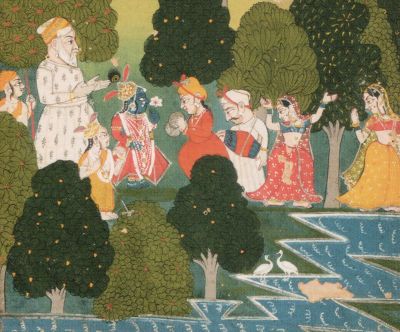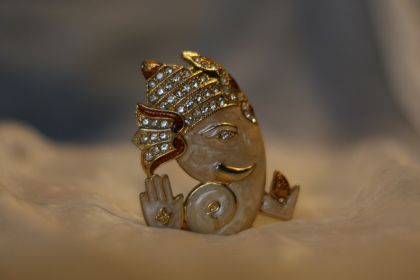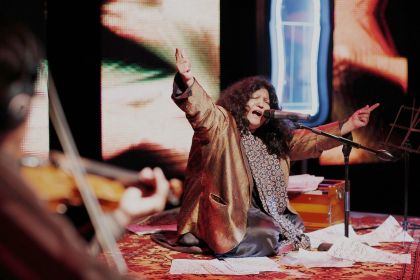SONGWRITER
Sūrsāgar: ocean of poetry that expanded for five centuries

Sur Sagar manuscript
Music Period: Indian Classical
Country: India
Genre: Devotional Song
Piece of Music: Sab Seoonchi Prem Sagai
Sūrdās was a North Indian devotional poet, musician, and saint who lived in the 16th century. His lyrics, addressed especially to Lord Krishna, are usually considered to be the finest expressions of Brajbhasa, one of Hindi’s two principal literary dialects.
Fact and fiction are inextricably woven together to create the rich legend of this great saint. For instance, the date of his birth is sometimes given as either 1478 or 1479, while his death date is placed variously at 1581 or 1584. All of these dates are somewhat doubtful because they place his age at over 100 at the time of his death. Although centenarians are common today, it is highly unlikely that anyone would live to this age in medieval India.
Some say he was born blind in Siri village near Delhi. Many others believe Sūrdās was born in Braj, a holy place in the northern Indian district of Mathura, associated with the exploits of Lord Krishna. His family was too poor to take good care of him, which led the blind boy to leave home at the tender age of 6 to join a wandering group of religious musicians.
Sant Sūrdās and Lord Krishna:

A chance meeting with great sage Vallabha at Gau Ghat by the river Yamuna transformed Sūrdās' life. He took lessons in Hindu philosophy and meditation and followed the life that was typical of a Hindu holy man. Sūrdās never married and lived on meager donations that were given as he sang bhajans (devotional songs) and lectured on religious subjects.
His reputation as a singer and a devotee spread far and wide. One day in the court of the Mogul emperor Akbar, one of Sūrdās’ songs was sung by the emperor's favorite singer Tansen. Akbar, being a broad-minded Muslim, invited Sūrdās to his court. Sūrdās replied that he only sang in the court of his beloved Krishna. On hearing this, Akbar personally came to Sūrdās and listened to his prayer songs in the temple.
Watch Sūrdās' widely known chant Sab Seoonchi Prem Sagai performed by Jagjit Singh and Chitra Singh:
Poems attributed to Sūrdās have been composed and collected gradually, expanding from a collection of about 400 poems that must have been in circulation in the 16th century to editions of some 5,000 in the 20th century. A 19th-century manuscript boasts twice that number. The size of this cumulative tradition, in which later poets evidently composed in Sūr’s name, justifies a title that had already been assigned to the corpus by 1640: Sūrsāgar means Sūr’s Ocean.
Watch Sūrdās' song from TV series Shri Krishna sung by Suresh Wadkar:
Although Sūrdās is known for the Sūrsāgar, he also wrote Sūr-Saravali, which is based on the theory of genesis and the festival of Holi, and Sahitya-Lahiri — devotional lyrics dedicated to the Supreme Absolute.
Sūrdās' verse is also credited as one that lifted the literary value of the Hindi language, transforming it into a pleasing tongue.
Sūrdās, however, is not just a name of a poet—it has become a term of art as well. The blind beggar singers singing in the trains are referred to as Sūrdās.



